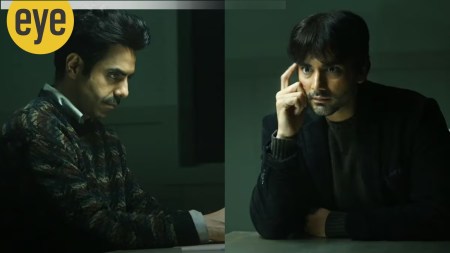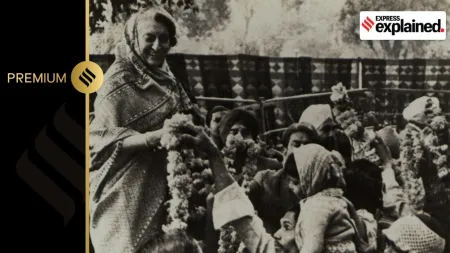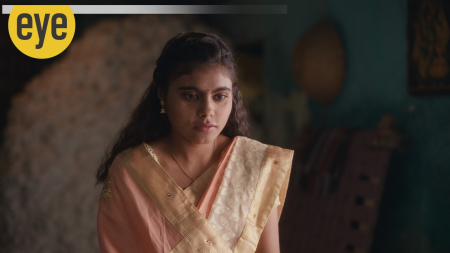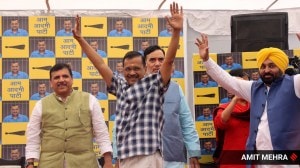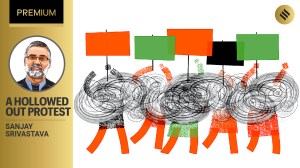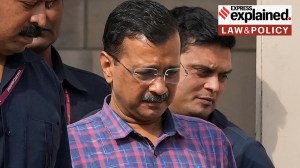- India
- International
Shyam Saran at Idea Exchange: ‘China made a wrong bet… whichever way you look at it, Russia has lost this war’
A former foreign secretary and then Prime Minister’s special envoy on nuclear deal and climate change, Shyam Saran understands China — its history, language, culture and politics better than most in Indian strategic circles.

Shyam Saran talks about how India should be mindful of China’s internal politics, the shift in the Euro-centric worldview and maintaining India’s strategic ties. This session was moderated by Shubhajit Roy, Deputy Chief of National Bureau, The Indian Express
Shubhajit Roy: You write in the book (How China Sees India and the World) about how you went to China and made friends. What did you see that changed your perception?
It was only in 1974 that I crossed into China for my first posting. That was a China which, unlike today, was entirely closed to the rest of the world. And then I returned in 1983. It almost seemed as if this was a kind of Wild West China where people were taking this dictum of ‘to get rich is glorious’ very seriously. But even that pales in comparison to what I see when I go to China today; it’s a modern-day marvel. There is no doubt that there has been a 40-year sprint which has completely transformed China.
Shubhajit Roy: China has built about itself an image, that it was the leader of the past and wants to reclaim that place. How have you busted that image in the book?
Every culture and civilisation has stories to tell about itself. Those stories are always positive stories. One of the things that China continues to put across is that India has never quite been independent because, for years, it has been ruled by alien empires. But they neglect to mention that for a lot of its recorded history China was also under alien rule… Today, China says that the Belt and Road Initiative is nothing but a re-establishment of the old Silk Road with China as the centre of that old economic and trade network. The fact is that China, in terms of those silk roads, was actually at the periphery. It was at one end of the Silk Road — it was not one road, it was a network of roads leading out of China or India or Persia.

So, what is China doing? It is coming back into its own, and therefore should be deferred to… and it is not comfortable when a country like India, for example, seen as an upstart country, tries to contest that centrality.
What we are seeing today is China coming back into its own and therefore, should be deferred to… and is not comfortable when a country like India, seen as an upstart country, tries to contest that centrality
Shubhajit Roy: You talk about the contestation with Tibet that took place… Do the scars of 1962 shape India’s thinking, when it comes to border negotiations with China?
I do not say that it was a mistake on the part of India to receive the Dalai Lama. If we had not, I think it would have gone against everything that India stands for. But, there was perhaps a misunderstanding in India about how important the Tibet issue was for China. Anything that was being done on the Indian side was being looked at through the prism of nervousness by China. What were tactical manoeuvres in an earlier period became a kind of a strategic confrontation in the later period. We did not recognise that that change had taken place.
Shubhajit Roy: In 2005, China was part of the climate change negotiations. But then that tone changed from 2008.
Chinese policy, not just towards India, but its foreign policy is very much influenced by how China sees geopolitics around itself. In 2007-08, you had the global financial and economic crisis. Hank Paulson was the treasury secretary of the United States. And he had a strong relationship with Wang Qishan, who is today the Vice-President of China. He was a key negotiator with the West, particularly the United States. And he tells Paulson, after the economic and financial crisis, that we thought you were our teacher, but today, the teacher has failed. And now you have to learn from us. So, you see, the change that has taken place. China has emerged relatively unscathed from the crisis. In China, even a two per cent rate of growth over this large base means they are perhaps adding a new India every few years. So, that is why the Chinese after 2007-2008, would always say that our Indian friends should realise that China is today five times the size of India, and naturally, this will have an impact on India-China relations. Meaning, you should know your place.
Shubhajit Roy: In 2005, the nuclear deal was just being negotiated. Wen Jiabao comes here and China starts to upgrade its relations with India. What had happened?
China began to believe that India may go further ahead with its relationship with the United States, and that would be a negative development from China’s point of view. So, China was trying to put across to India that it is not a threat and that there was enough space in Asia, and the world, for the simultaneous rise of India and China. That was the time when they also gave us a map, which, for the first time, showed Sikkim as a part of India. They were willing to make some concessions to ensure that India retained a certain mobilised position and we were able to leverage that. In a sense, we got something from China, and something from the United States, as well; we were in a sweet spot.
Shubhajit Roy: Could you explain your thesis on the future of the India-China relationship?
Throughout history, the Chinese have had periods where there has been a strong central authority, a strong leader, who has delivered both economic prosperity and political stability. There is certain ingrained authoritarianism. That is not the case with India. Maybe it’s because of invasion, migration or trade, but remarkably, India has been an open culture and civilisation. You would agree that we are a pluralistic society. And democracy is the best political dispensation to handle this reality. I would be very disappointed if India looked upon China as its model, what I call dictator envy. It is important for India to be more Indian, rather than to see this as the model for the future. For all its faults, there is a variety of opinion, dissent, which is still available in India, which really is our strength.
After 2007-08, they would say that our Indian friends should realise that China is five times its size, and naturally, this will have an impact on India-China relations. Meaning, you should know your place
Shubhajit Roy: How is the India-US relationship different today than it was at your time?
The kind of depth and breadth that the India-US relationship has acquired in the last couple of decades, since I was foreign secretary, to me, has been a very surprising development. If you told me in 2005 that 20 years later, we would have such a strong military-to-military relationship, a strong counter-terrorism relationship, I would have probably said that that is an unrealistic prospect. But that has happened. I would have been one of the persons to oppose the signing of all the three foundational agreements between India and the United States. But, there is a recognition that in terms of the challenges that we face, and will continue to face, this relationship is going to be very critical. And I agree with that.
Shubhajit Roy: In your book, you say that the Ukraine war and weakening of Russia has meant that China is more restrained. And that gives some sort of breathing space for India. Why do you say that?
The opposite could happen too. I may be wrong, but, to me, China made a wrong bet in that declaration that they signed on February 4, in Beijing (with Russia). Because I believe that whichever way you look at it, Russia has lost this war. Even if there are battlefield successes tomorrow, if you leave Ukraine as complete rubble, is that victory for Russia? This is also accentuated by the domestic problems that China is facing, because of the way it has handled COVID-19. There is also a huge debt overhang. For these reasons, perhaps, China will need to trim its sails.
If you told me in 2005 that 20 years later, we would have such a strong military-to-military relationship with the US, I would have probably said that is unrealistic… I would have opposed the signing of the three foundational agreements with the US
Shubhajit Roy: How do you see India-China diplomacy right now?
India has done well in terms of keeping the lines of communication open, and engagement with China open. It is the Chinese who are a little nervous about what India might do, with BRICS or RIC. I think we should keep them guessing. And keep the engagement going.
P Vaidyanathan Iyer: Does a change in leadership styles affect how China perceives India?
We think that the personal relationship with a Chinese leader will be important but for the Chinese, perhaps, that is not so important. That means (president) Xi Jinping will not be looking at his personal equation with an Indian leader whether it is (Narendra) Modi or Manmohan Singh. He will look at the balance of power. Where does India fit in, in how they see the global equations evolving? So, this is something that we need to also understand that whether it is this Chinese leader or that, the language which they use usually does not change. It is not in the leadership changes that China looks at India, but the way it formulates its policy towards India, that will be a big change.
Ritu Sarin: Indian diplomacy has been in the news because of what Rahul Gandhi said. And then the EAM (External Affairs Minister) gave a pretty vitriolic sort of defence. As a veteran, which side are you on?
I don’t think I should take sides at all. Every new government believes that it is making a departure from the past and doing better than the previous government. Despite these changes in behaviour, I actually am impressed by the remarkable continuity in terms of Indian foreign policy. If you take, for example, the relationship with the United States. Going back to Atal Bihari Vajpayee and seeing what we have today, there is hardly any change. In fact, I would say there has been a stronger attention paid to the relationship with the US than the time when I was foreign secretary. The other aspect is with respect to China itself, for what it did in eastern Ladakh. Again, the general approach of Indian foreign policy has been that even though you may have areas of confrontation with China, there are also areas where there is some degree of convergence of views. We should be firm in confronting them where our interests are being threatened but we should also not give up engaging with China.
And, I don’t know on what basis Rahul Gandhi made that statement. In my conversations with foreign diplomats I have not come across that view expressed that your colleagues have become very arrogant or pushy. But that there is a more determined articulation of what our policies should be, that is there, at the level of the foreign minister himself and I’m not surprised, if officers in External Affairs take their cue from that or what the PM is saying, but overall, in the direction of our foreign policy, I do not see much of a change. Even with respect to Ukraine, I do not see a change.
Raj Kamal Jha: Since 2014, even in state elections, we hear a lot more about foreign policy. On the street, too, it is framed in terms of India’s standing in the world. How do you read this?
During the earlier phase of my career, foreign policy was not something that was so publicly debated. Essentially, the lines set by (Jawaharlal) Nehru continued, in a sense, without much dissent. However, that began to change over a period of time. The big test actually came with the nuclear deal. That was perhaps the first time that you had a huge amount of debate in Parliament, and also a lot of public comment as well. As foreign secretary, I had to go out and explain things in the earlier period. What I see today is really a continuation of that trend. By the way, this is not a negative trend. I think Indian foreign policy would actually gain from the greater debate and public comment.
However, what is worrying, sometimes, is that there has to be some effort made to keep foreign policy issues, as far as possible, not mixed up with domestic issues or political issues. That creates a problem. For example, one of the success stories of India recently has been the improvement of its relationship with Bangladesh. But then all that gets vitiated when somebody starts talking about the people coming across the border or talking about how in Jahangirpuri, Bangladeshis were involved in the riot. To think that this will not resonate across in Bangladesh is simply unrealistic, it does have an impact.
With regard to neighbouring countries, it is not always possible to have that complete division between domestic issues and foreign policy issues. But that effort needs to be made because that is what India’s interests demand.
Shubhajit Roy: Did Galwan surprise you?
I do not understand why this happened. Under the previous government, I had carried out several border-infrastructure surveys. My reading is that earlier, because the infrastructure on the Chinese side and on the Indian side was not so developed, it was infrequently that Indian patrols and Chinese patrols came face to face. And the protocol was that you disengage, you don’t get into a confrontation. What seems to have happened is that with the improvement of infrastructure on the Chinese side, and on ours, many of the areas which were not easily accessible, became accessible. So, the encounters between the two sides became much more frequent. Perhaps the kind of peace and tranquillity protocols and confidence-building measures that we had put in place earlier, needed to be updated. Perhaps that would be one of the reasons, I may be wrong. But that could be one reason. But I think behind all this is that sense: we are a much stronger power, we can dictate terms. That’s the kind of mindset which I’m afraid is very much in evidence today.
Harikishan Sharma: What is your view on India’s handling of the Ukraine crisis?
I do not disagree with the position taken by this government as far as the Ukraine crisis is concerned. The question is, what about our relationship with Russia? The strategic glue which held India and the Soviet Union together was really the common threat we perceived from China. What changed in 1990? The Soviet Union collapsed, the relationship between Russia and China, which was very adversarial, first but became somewhat neutral, ended up with the February 4 Joint Declaration.
Once the Ukraine crisis settles down, what does this mean in terms of Russia’s relationship with China? That is the critical factor. And how we respond will very much be determined by that because going forward it will remain a major strategic challenge for India. If we are looking at what can help India transform itself and become a stronger power, having strong partnerships with these countries is actually in India’s interest. How we leverage those partnerships depends upon us.
Why shyam saran
A former foreign secretary and then Prime Minister’s special envoy on nuclear deal and climate change, Shyam Saran understands China — its history, language, culture and politics better than most in Indian strategic circles. As someone who has conducted diplomacy at the highest levels with China, the US and Russia, his analysis is taken seriously by those in top ranks in governments across the world. His latest book — How China Sees India and the World (Juggernaut) — is a masterclass on Chinese history and its strategic thinking, and how it impacts India and the world.
Must Read
May 11: Latest News
- 01
- 02
- 03
- 04
- 05


